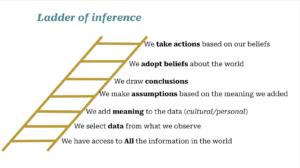Coaching Beliefs of Excellence: Series 1
Every Individual is Unique!
As individuals we are shaped by a variety of factors. We are shaped by:
- Our experiences;
- Other People’s experiences;
- Individuals we meet;
- Opportunities available to us;
- Life and technical knowledge we acquire;
- What has and what has not worked for us;
- Our values and belief systems, among other things.
While what shapes us and what lessons we learn along the way may be similar, our experience through this journey can only be ours and is unique to us. Additionally, how we are shaped is also vastly different. Most of us tend to know this instinctively or rather without someone having to tell us that this is true.
 I was watching an episode in which a mother was very confused about how her two sons grew up to be very different people. One exuded strength and played the “saviour” role in all aspects of his life, and the other seemed to consistently check all the proverbial “problem child” boxes.
I was watching an episode in which a mother was very confused about how her two sons grew up to be very different people. One exuded strength and played the “saviour” role in all aspects of his life, and the other seemed to consistently check all the proverbial “problem child” boxes.
Like any mother would do, she kept asking herself how this could be, sometimes out loud to people around her. One of the people she talked to had the most profound response. He referred to both sons metaphorically as two pieces of glass that had been broken. One of the sons broke into a sharp piece of glass capable of inflicting severe damage to any threat that came his way. He used his sharpness to turn into a self-sufficient and strong individual with a soft spot for those born into disadvantage. He gravitated towards roles that made him the protector and he would always put himself in the line of fire. The other son, however, shattered into tiny specs that would definitely need a lot more work to put back together and because he shattered, the structural integrity of what was left of him would reasonably be expected to be different from his brother’s. This made him gravitate towards totally different priorities and opportunities for life.
Here you have two people living under the same roof, with the same parents, presumably having similar experiences turning out to be two different people. Both still had a lot to work on because of being broken, but how their experience shaped them was very very different.
This is true even for “positive” life stories. Multiple people can have similar wonderful opportunities in life and be equally protected from the evils of life but they can still grow into completely different people.
How is this related to coaching?
Ladder of inference
Every individual has a unique combination of filters, with which they perceive the world. We all go through a specific thinking process, usually without realising it, to get from a fact to a decision or action. Let’s assume this process is a ladder. Every time we need to take action we filter the information we have to make the best possible decision we can.
This takes many forms but typically looks as illustrated:

There can be a difference between the actual world and our understanding of the world as we perceive it to be since we add meaning to what happens in the world through our own lens (which has been shaped by our unique experiences). This is called the ladder of inference. The ladder of inference can impact a lot in our day to day lives:
- It can impact who we choose to build relationships with personally and professionally and inversely, who we choose not to build relationships with
- It can impact how we react to external stimuli (what people do and say or general events that happen to us)
- It can impact how effectively we communicate (that is, how we understand what is directed at us and how we transmit our messages to others)
There may be instances in coaching when your ladder of inference may be challenged. It is very important to note that challenging your ladder of inference is not the same as questioning your beliefs or minimising your experience. It is simply one of the tools for development aimed at supporting you to become more aware of what you believe to be true: about yourself, other people, and the issue you are working on and how it impacts your view of life. The intended value of challenging the ladder of inference is; a well-informed journey of development and growth.
 Pulse Check: Consider a situation where a colleague at work sends you an email requesting something from you. You respond to them asking for more time to deliver. Shortly after they respond to you with their manager in copy.
Pulse Check: Consider a situation where a colleague at work sends you an email requesting something from you. You respond to them asking for more time to deliver. Shortly after they respond to you with their manager in copy.
What is the first thought that came to mind?
Now let us explore the possibilities:
- There is a possibility they felt that copying their manager would get you to move faster
- There is also a possibility that the manager themselves requested to be added to the chain to keep apprised of progress
- It is also possible that your colleague forgot to copy their manager in the initial email and is doing what they should have done from the start
- And it is also possible that the employee may be taking time off soon and is including their manager for continuity purposes
Even with these possibilities, the intent behind the action is not fully apparent.
Has anything shifted for you as relates to how powerful the ladder of inference is?
Fit for purpose development
In addition to the ladder of inference, the process of personal development and how individuals need to develop based on their needs, cannot and should not be universally applied. While already existing development priorities and guidelines can be sound in and of themselves, their respective relevance, effectiveness and appropriateness to individuals or individual situations are not identical for the simple fact that they are not tailored to the unique circumstances of the situation at hand. This does not mean they cannot work, it simply means the results will vary.
That being said, the process being referred here, is different from the methodology a coach would use to support you during the coaching journey. A methodology is a system of methods and principles that govern a particular field and helps one operate within the ethical and professional boundaries of that field. The principle we are discussing today forms part of the coaching methodology. The same applies to other tools that coaches may use such as self-evaluation assessments.
The process of finding solutions on the other hand is a personal journey with the “coachee” in the driver’s seat. It is about becoming more aware of yourself and your environment, identifying what you want to work on, and what approach would work best for you. It should provide room for adapting as needed to get your desired results or building on lessons learned to further develop and grow. For this reason, rarely will you find coaches prescribing solutions. The furthest they may go, is to call your attention to available options, but the decision will always fall on you as a “coachee”.
 Pulse Check: Person x opens up to person y about difficulties in their relationship with their siblings. Person y recently went through very similar challenges and found a solution through therapy. Person y recommends that whenever person x has a difficult conversation with their siblings, they should use “I feel …” statements. Person y also gives person x their therapist’s contacts and asks person x to call and schedule an appointment.
Pulse Check: Person x opens up to person y about difficulties in their relationship with their siblings. Person y recently went through very similar challenges and found a solution through therapy. Person y recommends that whenever person x has a difficult conversation with their siblings, they should use “I feel …” statements. Person y also gives person x their therapist’s contacts and asks person x to call and schedule an appointment.
- What are your thoughts on this situation?
- Would you have made the same recommendation?
- What has shifted for you about the process of finding solutions and the solutions themselves?
Objectivity of the coach
Coaches also have to apply this principle in their engagement with clients to ensure they remain objective, provide a safe space free of judgement for their clients, and retain their role as partners to their clients as opposed to acting as an instructor. This is all-encompassed in various codes of ethics for coaches
Coaches, therefore, need to keep their ladder of inference in check and focus on you as a client. Coaches also need to stay present in their engagement with you and walk with you through your journey of self-discovery and self-development. Finally, while the coach may challenge your beliefs, they do not go beyond that by telling you whether your beliefs are right or wrong.
These are all important qualities to maintain during the coaching relationship because there is no one more capable of resolving challenges and developing than you. You know yourself the most, you know the experience you are working on the most, you know your capabilities the most and you are the only one capable of unlocking your own growth and development. Simply put, you have within you, all the resources you will ever need to get the results you want. The coach, therefore, only serves as a partner and guide through your journey.